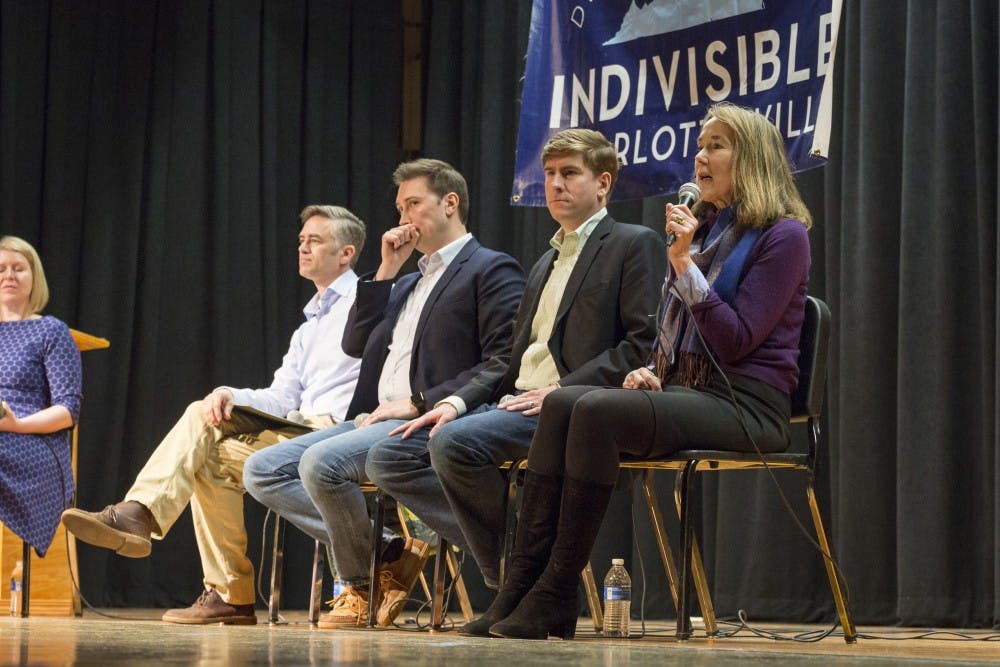Charlottesville citizens gathered for a debate between the four democratic candidates for the Fifth Congressional District nomination — Roger Dean Huffstetler, Leslie Cockburn, Ben Cullop and Andrew Sneathern — in the Buford Middle School auditorium Saturday afternoon. Hosted by Indivisible Charlottesville, a local progressive group, the event was one of several public gatherings featuring the four candidates before the nominee is selected by the Virginia Fifth Congressional District Democratic Committee in a convention May 5.
Although the committee will ultimately choose the Democratic nominee, citizens can attend the Charlottesville caucus April 21 to support delegates who will go on to vote for their favored candidate.
The debate occurred in the wake of Lawrence Gaughan, a fifth candidate who was seeking the nomination, dropping from the congressional race March 9. Gaughan was the Democratic Party’s nominee for the Fifth Congressional District in 2014. He cited the increase in the filing fee for candidates as the reason for his withdrawal, which has jumped from $500 to $5,000 in recent years.
Nicole Hemmer, an assistant professor in presidential studies at the Miller Center, moderated the debate. Hemmer covered major topics such as gun violence, healthcare, economic growth and education, among other issues.
After gun control was introduced as the opening topic, Cullop established the common ground the four candidates had on this issue.
“We’re all for banning assault weapons, for limiting magazine sizes, for ensuring that domestic abusers won’t have access to firearms,” Cullop said. “I believe that we’re not going to solve this issue until we … elect a wholesale new generation of leaders.”
Huffstetler proposed further steps that could be taken to address gun violence, such as the repealing of the Dicky Amendment, a 1996 bill provision lobbied for by the National Rifle Association that prohibits any Center for Disease Control and Prevention research from being used in gun control efforts. Huffstetler further reinforced the idea of comprehensive and exhaustive background checks and noted a “Jacksonian” population in America that would always resist gun control.
Sneathern echoed this acknowledgement of passionate gun owners, while still pushing for potential change.
“I think that the vast, vast, vast majority of gun owners are like I am,” Sneathern said. “They look at this as something that we can reasonably change and we can do things to make our children and all of our lives safer.”
Cockurn discussed introducing a voluntary federal buy-back plan of assault weapons, strictly limiting the ability of individuals convicted of domestic violence to have access to firearms and placing federal restrictions on purchasing large-capacity magazines or bump stocks.
The matter of healthcare was an issue divided between two plans, the Medicare for All — a bill proposed by Sen. Bernie Sanders (D-Vt.) featuring a federally administered, single-payer health system — and Medicare X — a government-administered public healthcare option sponsored by Sen. Tim Kaine (D-Va). Cockburn and Sneathern said they support Medicare for All, whereas Cullop and Huffstetler said they support Medicare X.
Cockburn, Cullop and Sneathern all addressed the financial difficulty of paying high medical costs in America and the need for policy changes.
“I think there’s no question that we have to dramatically change where our medical system is now,” Cockburn said. “Why should we spend 1,000 times more for a drug then is spent in Canada? … This has to stop.”
Huffstetler focused on what he considered the three necessary components of healthcare — better coverage, access and quality, arguing Medicare only addresses coverage.
“We want everybody to have coverage, but we also want high quality, affordable health care for everybody in every zip code,” Huffstetler said.
Economic growth was introduced in the context of the proposed idea of raising the minimum wage in Virginia to $15 per hour from the current $7.25 per hour.
Cullop advocated for a proportional increase of the minimum wage and discussed the potential threat to small business owners if the minimum wage is raised to $15 per hour while not accounting for local differences in the cost of living.
Cockburn emphasized the concept of expanding currently successful industries in Virginia, such as timber, tourism and agriculture, in order to create a sustainable labor force and economy. She also agreed the $15 per hour raise would benefit the Virginian economy.
Huffstetler focused on closing the “middle skills gap,” in which there is a lack of education and training for skilled labor, leaving a “gap” in the job market.
Sneathern advocated for investing in local, small-business labor markets rather than depending on one large company for employment, with the risk of the company failing, evolving or moving and crippling the local economy.
The cost and impact of higher education was briefly addressed. Cockburn and Sneathern said they support for free tuition for public colleges, whereas Cullop said that tuition should be free based on financial need. Huffstetler focused instead on ensuring the quality of teachers by properly paying faculty and ensuring a quality education for all.
Hemmer then directed specific questions to each of the four candidates addressing weaknesses or concerns about their candidacy.
Sneathern defended his relative lack of campaign funding, having $55,911 less than the nearest candidate and more than four times less than the leading fundraising candidate as of Dec. 31, 2017, by emphasizing relationships as superior to funding. Huffstetler focused on his Virginian loyalty despite having grown up in North Carolina and only moving to the Fifth District in the past few years. Cullop talked about his background in education to counter concerns over the relevance of his previous career to politics, as he is currently an investment associate for Manchester Capital Management. Cockburn acknowledged Hemmer’s assertion that she could be considered a member of the “liberal elite” due to her career with upper-tier media outlets and overall social class.
After the May 5 nomination, the selected nominee will face Republican incumbent Rep. Tom Garrett in the November Fifth Congressional District general election.







